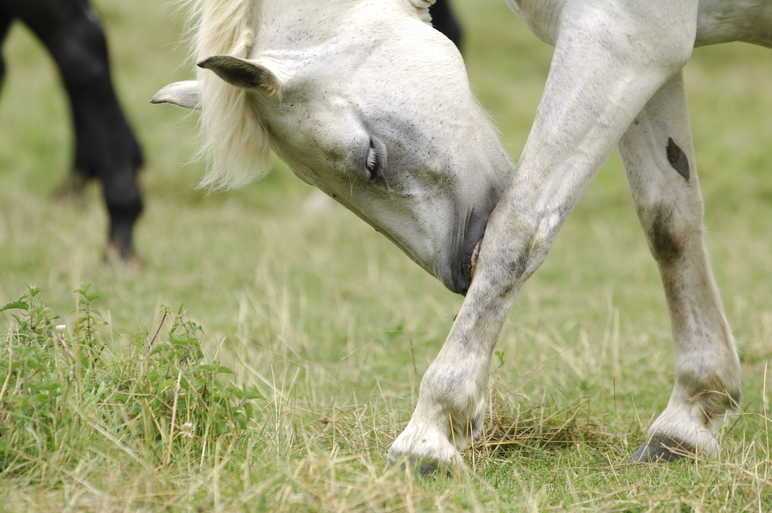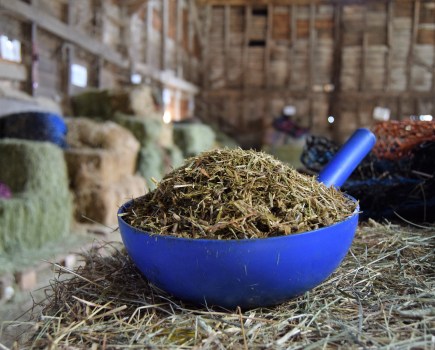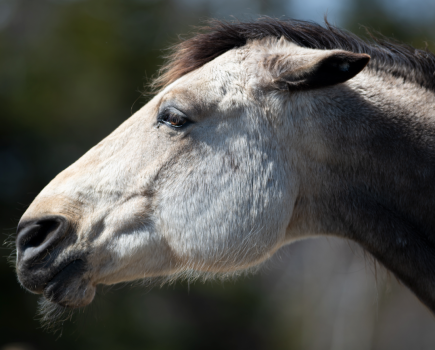Sweet itch in horses is caused by an allergic reaction to the saliva of the Culicoides biting midge and really affects horse health. These biting bugs love warm, humid conditions with plenty of rain, so they are usually more prominent in spring, summer and autumn. Some horses and ponies become so itchy that they scratch areas of their bodies until they are red raw and bleeding; manes and the top of tails are particular problem areas for itching.
“Horses affected by sweet itch develop itching of the mane and tail and, in some cases, the face and poll,” explains equine vet Leona Bramall. “Itching begins in summer, but for some horses sweet itch can be a year-round problem. The level of severity varies. While some horses itch themselves bald, others may develop ulceration or secondary bacterial infections.”
Preventing sweet itch in horses is all about reducing their exposure to the offending midges. This means stabling affected horses at dawn and dusk, as this is when the midges are most active. Setting up a fan (safely) in the stable can help to deter midges from entering stables. Sweet itch fly masks and fly rugs play an integral role in protecting horses and ponies from biting midges and therefore can help to prevent sweet itch symptoms, fly and insect repellents, although the effectiveness of these varies. When turning out, choose a field well away from marshy areas or adjacent to woodland, as these have high populations of midges. You should also avoid fields with stagnant water.
Sweet itch in horses: when to call a vet
“Contact your vet if your horse’s itching continues despite using the above preventative measures, if skin is hot and inflamed, or if you’re concerned about possible infection,” advises Leona. “Your vet will examine your horse and may prescribe injectable, oral and/or topical (cream) medications.”
Leona also warns that in addition to sweet itch, some horses can develop skin lumps (urticaria), with or without associated itching secondary to other flies and insects. Severity varies from a small lump at the site of contact to an extensive hypersensitive response.
“If your horse is stabled during the day, ensure their stable is kept as clean as possible and skipped out frequently to reduce the number of flies in the stable environment,” she adds. “You can also spray the stable with fly repellents, but don’t spray directly near water or feed buckets. If the lumps on your horse are extensive, don’t appear to be resolving, or make your horse itch, seek advice from your vet.”
Sweet itch in horses: why early intervention is key
World Horse Welfare concurs that prevention is better than cure when it comes to managing sweet itch in horses. The charity reminds horse owners that the condition starts before the summer months begin.
“One of the worst things you can do is ignore the early signs. If you suspect your horse is suffering from sweet itch, the first step is to try to stop your horse from getting bitten and then contact your vet for advice,” says a spokesperson for World Horse Welfare. “Grooming your horse regularly is a good way to keep a close eye on their skin so you can recognise any changes and take appropriate action quickly.”
According to Hilary Page Self, medical herbalist and director of Hilton Herbs, there is research and anecdotal evidence to show that herbs can be used to help minimise the symptoms of sweet itch in horses. Useful herbs to consider include the following, but remember to consult your vet before making any sudden dietary changes.
Steamed linseed
Steamed linseed has been known to alter the fatty-acid profile of the horse’s hair and reduce irritation. Linseed is a rich source of the essential fatty acid, Alpha Linolenic Acid (ALA), and research suggests that foods rich in ALA could reduce inflammation and improve the clinical appearance of sweet itch.
Brewer’s yeast
Brewer’s yeast contains a range of B vitamins and amino acids that are said to help reduce the horse’s allergic response to the Culicoides midge. Brewer’s yeast also makes the blood unpalatable to midges and is vital for hair growth and the production of cell membranes.
Buckwheat
Buckwheat contains high levels of flavonoids and anti-oxidants, such as quercetin, which acts like an anti-histamine and an anti-inflammatory.
Silica
Silica is a major component of hair so the rich silica content of diatomaceous earth is what helps stimulate hair growth, hair strength and hair quality.
“Sweet itch is a very difficult condition to treat,” says Hilary. “Most horse owners end up managing the problem with a combination of things such as a midge rug, organising turnout to avoid peak midge times and topical products and feed supplements.
“Always bear in mind that just because a substance is deemed ‘natural’, it doesn’t mean it can be used excessively,” continues Hilary. “Respect the instructions for use in the same way you would with conventional medication. Ensure that all herbal supplements and healthcare products are sourced from suppliers who can guarantee top-quality ingredients and expert formulations. These suppliers should be able to provide detailed information on product use and there’s a legal obligation on manufacturers to clearly state ingredients on the packaging.”
Is it sweet itch?
Excessive rubbing, bald patches or broken skin are all signs that a vet should be consulted. Although sweet itch in horses is common, there are other reasons why a horse may become itchy which should be ruled out as a possible cause. Lice, for example, are difficult to see with the naked eye. While some horses carry lice with few clinical signs, others are intensely itchy and become very distressed. Lice are easily transferred by grooming equipment and rugs, so all of this should be treated if a case of lice is diagnosed
Pinworm is an intestinal worm found near the rectum and can easily be confused with sweet itch in horses, because it triggers a horse to rub its tail in a bid to alleviate itching around the rectum. Adult pinworms lay eggs around the horse’s anus and surrounding skin. It’s these eggs and the sticky ‘glue’ used to attach the eggs to the skin that causes itching.
Lastly, a skin infection could be the cause of itching rather than sweet itch, especially when a horse has a thick winter coat. A visit from your vet will quickly lead to a diagnosis.









